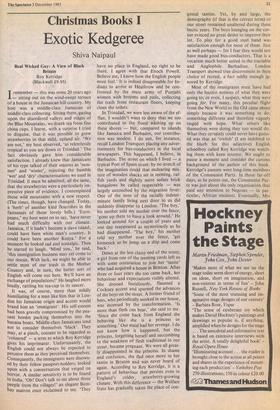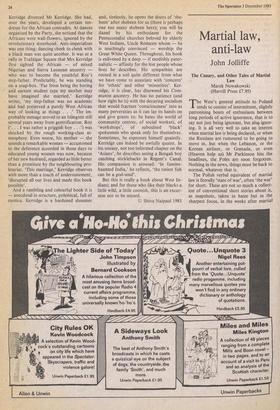Christmas Books I
Exotic Kedgeree
Shiva Naipaul
Real Wicked Guy: A View of Black Britain Roy Kerridge (Blackwell £9.95) T remember — this was some 20 years ago I— sitting out on the wind-swept terrace of a house in the Jamaican hill country. My host was a middle-class Jamaican of middle-class colouring. Sitting there, gazing upon the disordered valleys and ridges of the Blue Mountains, we drank tea from fine china cups. I learnt, with a surprise I tried to disguise, that it was possible to grow strawberries in that mild, upland air. 'We are not,' my host observed, 'as relentlessly tropical as you are down in Trinidad.' The fact obviously gave him considerable satisfaction. I already knew that Jamaicans of his type talked of their seasons as 'sum- mer' and `winter', rejecting the humble 'wet' and 'dry' characterisations we used in Trinidad. It must be admitted, all the same, that the strawberries were a particularly im- pressive piece of evidence. I contemplated those wild mountains with a new respect. (The times, though, have changed. Today, a 'herb' of another kind flourishes in the fastnesses of those lovely hills.) 'Euro- peans,' my host went on to say, `have never had much difficulty with our climate. Jamaica, if it hadn't become a slave island, could have been white man's country. It could have been another Kenya.' For a moment he looked sad and nostalgic. Then he started to laugh. `Mind you,' he said, 'this immigration business may yet come to our rescue. With luck, we might be able to settle most of our trash in the Mother Country and, in turn, the better sort of English will come out here. We'll have an exchange of populations!' He laughed more loudly, rattling his tea-cup in its saucer.
It was, of course, more than mildly humiliating for a man like him that in Lon- don his Jamaican origin and accent would brand him an 'immigrant'. His self-esteem had been gravely compromised by the pea- sant hordes packing themselves into the banana boats. Middle-class Jamaicans tend not to consider themselves 'black'. They may, at a pinch, consent to be regarded as `coloured' — a term to which Roy Kerridge gives his imprimatur. Unfortunately, the English could not always be expected to Perceive them as they perceived themselves. Consequently, the immigrants were disown- ed by their fellow passport-holders; looked upon with a consternation that verged on horror. A similar sensitivity is to be found in India. 'Oh! Don't talk to me about those people from the villages!' an elegant Bom- bay matron once exclaimed to me. 'They have no place in England, no right to be there. I agree with that Enoch Powell. Believe me, I know how the English people must feel.' It is indeed disagreeable for In- dians to arrive at Heathrow and be con- fronted by the mute army of Punjabi women with brooms and pails, collecting the trash from restaurant floors, keeping clean the toilets.
In Trinidad, we were less aware of the ef- flux. I wouldn't want to deny that we too contributed to the flood washing up on these shores — but, compared to islands like Jamaica and Barbados, our contribu- tion was modest. I do not, for instance, recall London Transport placing any adver- tisements for bus-conductors in the local newspapers. This happened, I believe, in Barbados. The street on which I lived — a typical Port of Spain street: by no stretch of the imagination could that endearing mix- ture of wooden shacks set in teeming, raf- fish yards and slightly more sedate brick bungalows be called respectable — was largely untouched by the migration fever. One of the sons of the racially indeter- minate family living next door to us did suddenly disappear to London. 'The boy,' his mother told my mother over the fence, `gone up there to have a look around.' He looked around for a couple of years and one day reappeared as mysteriously as he had disappeared. 'The boy,' his mother told my mother over the fence, 'get homesick so he jump on a ship and come back.'
Down at the less classy end of the street, a girl from one of the teeming yards left us with some ostentation to join her `tantie' who had acquired a house in Brixton. After three or four years she too came back, her behaviour and expectations visibly altered. She dressed fastidiously, flaunted a Cockney accent and spurned the advances of the boys on the street. A former friend of hers, who periodically worked in our house, was incensed by the transformation. Is more than flesh can bear,' she said to me.
`Since she come back from England she behaving like she is a princess or something.' Our maid had her revenge. I do not know how it happened, but the princess, forgetting herself and succumbing to the weakness of flesh traditional in our street, became pregnant. We were all great- ly disappointed in the princess. In shame and confusion, she fled once more to her tantie in Brixton and was never heard of again. According to Roy Kerridge, it is a
pattern of behaviour that persists even in England's colder, strawberry-growing climate. With this difference — the Welfare State has gradually taken the place of con-
genial tanties. Yet, by and large, the demography (if that is the correct term) of our street remained unaltered during these hectic years. The boys lounging on the cor- ner evinced no great desire to improve their lot. To play for a good steel band was satisfaction enough for most of them. Just as well perhaps — for I fear they would not have made good bus-conductors. That is a vocation much better suited to the tractable and Anglophile Barbadian. London Transport showed true discernment in their choice of recruit, a fact oddly enough ig- nored by Kerridge.
Most of the immigrants must have had only the haziest notions of what they were going to; or even, I suspect, what they were going for. For many, this peculiar flight from the New World to the Old came about simply because it was something to do; something different and therefore vaguely tinged with hope. What others like themselves were doing they too would do. What they certainly could never have guess- ed was that an 'owlish' (I am indebted to the blurb for this adjective) English schoolboy called Roy Kerridge was watch- ing them with keen interest. We ought to pause a moment and consider the curious background of the author of this book. Kerridge's parents were long-time members of the Communist Party. In those far-off days, as he points out, the Communist Par- ty was just about the only organisation that paid any attention to Negroes — in par- ticular, African students. Eventually, Mrs Kerridge divorced Mr Kerridge. She had, over the years, developed a certain ten- dresse for the African comrades. At dances organised by the Party, she noticed that the Africans were wall-flowers, ignored by the revolutionary sisterhood. Anti-imperialism was one thing; dancing cheek to cheek with a black man was quite another. It was at a rally in Trafalgar Square that Mrs Kerridge first sighted the African — of mixed Nigerian and Sierra Leonean ancestry who was to become the youthful Roy's step-father. Predictably, he was standing on a soap-box. `Far from being the boring / and earnest student type my mother may have imagined she married,' Kerridge writes, 'my step-father was no academic and had preserved a purely West African way of looking at things . . .' The im- probable menage moved to an Islington still several years away from gentrification. Roy ('. . . I was rather a priggish boy . . .') was shocked by the rough working-class at- mosphere. Even worse, his mother — she sounds a remarkable woman — accustomed to the deference accorded in those days to educated young women was now, because of her new husband, regarded as little better than a prostitute by the neighbouring pro- letariat. 'This marriage,' Kerridge observes with more than a touch of understatement, `disrupted all our lives and made this book possible'.
And a rambling and colourful book it is — anecdotal in structure, polemical, full of exotica. Kerridge is a hardened slummer and, tirelessly, he opens the doors of 'she- been' after shebeen for us (there is perhaps one too many shebeen here); you will be dazed by his enthusiasm for the Pentecostalist churches beloved by elderly West Indians, Uncle Remuses whom — he is touchingly convinced — worship the Great White Queen. Throughout, his book is enlivened by a deep — if modishly pater- nalistic — affinity for the lost people whose lives he describes. His sympathies are rooted in a soil quite different from what we have come to associate with 'concern' for 'ethnic' and other `minorities'. Ker- ridge, it is clear, has disowned his Com- munist ancestry. He has no patience (and how right he is) with the decaying socialism that would fracture `consciousness' into as many perversities as it can lay its hands on and give grants to he hates the world of community centres, of social workers, of 'workshops', of subsidised `black' spokesmen who speak only for themselves, Sometimes, he expresses himself quaintly. Kerridge can indeed be awfully quaint. In his uneasy, not too informed chapter on the 'Asians', he describes seeing a Bengali boy catching sticklebacks in Regent's Canal. His compassion is aroused. 'In famine- haunted India,' he reflects, 'the tiniest fish can be a god-send'.
But this is really a book about West In- dians; and for those who like their blacks a little wild, a little coonish, this is an excur- sion not to be missed.
© Shiva Naipaul 1983















































 Previous page
Previous page